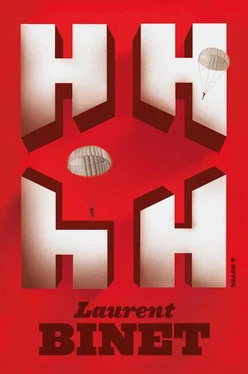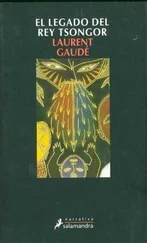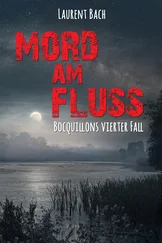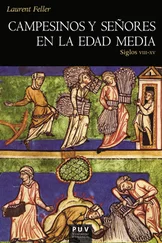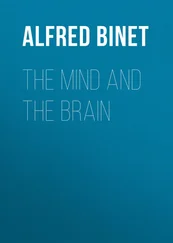Lieutenant Bartos wanted to cancel the operation. Sent by London to carry out other Resistance missions, Bartos is the highest-ranking officer among the Prague parachutists. But here, rank means nothing. The Anthropoid team, consisting only of Gabčík and Kubiš, received its instructions from London—from President Beneš himself. There are no more orders to be given now. The mission has to be accomplished, and that’s that. Gabčík and Kubiš are men, and everyone who rubbed shoulders with them has emphasized their human qualities: their generosity, their good nature, their dedication. But Anthropoid is a machine.
Bartos asked London to stop Anthropoid. In reply he received a coded message, indecipherable to everyone except Gabčík and Kubiš. Lying on his little iron bed, Gabčík holds the text in his hand. Nobody has found this document. But in a few encrypted lines, their destiny is mapped out: the objective remains the same. The mission is confirmed. Heydrich must die. Outside, creaking metallically, a tram moves away.
SS-Standartenführer Paul Blobel, the leader of Sonderkommando 4a of Einsatzgruppe C—the group that so zealously performed its task at Babi Yar—is going mad. At night, in Kiev, his car passes the scene of his crimes. In the headlights’ glare he contemplates the staggering spectacle of that ravine of the damned, and he is like Macbeth, haunted by his victims’ ghosts. The dead of Babi Yar are not easily forgotten, because the earth in which they’re buried is itself alive. Smoke rises from it. As the decomposing corpses produce gas bubbles that escape upward, clods jump out like popping champagne corks. The stench is foul. Blobel, laughing dementedly, explains to his guests: “Here lie my thirty thousand Jews!” And he makes a sweeping gesture that takes in the whole immense gurgling belly of the ravine.
If it goes on like this, the corpses of Babi Yar will be the death of him. At the end of his tether, Blobel travels all the way to Berlin to plead with Heydrich in person to transfer him elsewhere. He gets a suitable welcome: “So you’re feeling sick, are you? You spineless queer. You’re no good for anything but selling crockery.” But Heydrich quickly calms down. The man in front of him is a drunken wreck, no longer capable of carrying out the work entrusted to him. It would be pointless and dangerous to keep him in that job against his will. “Go and see Gruppenführer Müller. Tell him you want to go on vacation. He’ll remove you from your command in Kiev.”
The working-class district of Žižkov in eastern Prague is supposed to have the highest concentration of bars in the whole city. It also has lots of churches, as you’d expect in the “city of a hundred bells.” In one of these churches, a priest recalls that a young couple came to see him “when the tulips were in flower.” The man was short, with thin lips and piercing eyes. The young woman, I know, was charming and full of joie de vivre. They seemed to be in love. They wanted to get married, but not straightaway. The date they wanted to book was precise but uncertain: “two weeks after the war ends.”
I wonder how Jonathan Littell, in his novel The Kindly Ones , knows that Blobel had an Opel. If Blobel really drove an Opel, then I bow before his superior research. But if it’s a bluff, that weakens the whole book. Of course it does! It’s true that the Nazis were supplied in bulk by Opel, and so it’s perfectly plausible that Blobel possessed, or used, a vehicle of that make. But plausible is not known . I’m driveling, aren’t I? When I tell people that, they think I’m mental. They don’t see the problem.
Valčík and Ata (the Moravecs’ young son) have just had a miraculous escape during a police inspection that ended in the deaths of two parachutists. They are hiding out in the concierge’s apartment and telling him the story of their misadventure. I could tell this story, too, but what would it add, I wonder, to have yet another scene from a spy novel? Modern novels are all about narrative economy, that’s just how it is, and mine can’t keep ignoring this parsimonious logic. So, basically, all you need to know is that it was because of Valčík’s cool head and his perfect grasp of the situation that he and Ata were not arrested or killed.
Seeing how strongly this adventure and he himself have impressed the teenage boy, Valčík tells him helpfully:
“You see this wooden box, Ata? The Krauts could beat it till it started to talk. But you, no matter how much they beat you, you must say nothing. Nothing, you understand?”
That line, by contrast, is not at all superfluous to my story.
You might have guessed that I was a bit disturbed by the publication of Jonathan Littell’s novel, and by its success. And even if I can comfort myself by saying that our projects are not the same, I am forced to admit that the subject matter is fairly similar. I’m reading it at the moment, and each page gives me the urge to write something about it. I have to suppress this urge. All I will say is that there’s a description of Heydrich at the beginning of the book, from which I will quote only one line: “His hands seemed too long, like nervous algae attached to his arms.” I don’t know why, but I really like that image.
This is what I think: inventing a character in order to understand historical facts is like fabricating evidence. Or rather, in the words of my brother-in-law, with whom I’ve discussed all this: It’s like planting false proof at a crime scene where the floor is already strewn with incriminating evidence .
Prague in 1942 looks like a black-and-white photo. The passing men wear crumpled hats and dark suits, while the women wear those fitted skirts that make them all look like secretaries. I know this—I have the photos on my desk. All right, no, I admit it. I was exaggerating a bit. They don’t all look like secretaries. Some look like nurses.
The Czech policemen directing the traffic look strangely like London bobbies with their funny helmets. And just when the Czechs had adopted the system of driving on the right…
The trams that come and go to the sound of little bells resemble old red-and-white train carriages. (But how can I know that, when the photos are in black and white? I just know, okay!) They all have round headlights that look like lanterns.
Neon signs decorate the façades of the buildings in Nové Město, advertising beer, brands of clothing, and Bata, the famous shoe manufacturer. In fact, the whole city seems to be covered in writing—and not only adverts. There are V s everywhere: originally they were symbols of the Czech Resistance, but the Nazis appropriated them as an exhortation to the Reich’s final victory. There are V s on tramways, on cars, sometimes carved into the ground; V s everywhere, battling it out between two opposed ideologies.
Graffiti on a wall: Židi ven —Jews out! In shop windows, a sign to reassure the customers: Čisté árijské obchod —pure Aryan shop. And in a bar: Zada se zdvorile, by se nehovorilo o politice —Customers are kindly requested not to talk politics.
And then those sinister red posters, written in two languages like all the city’s road signs.
And that’s without even mentioning flags and other banners. Never has any flag signaled its meaning so powerfully as this black cross in a white circle on a red background.
Prague in the 1940s didn’t lack style, even if serenity was harder to come by. Looking at the photos, I keep expecting to see Humphrey Bogart among the passersby, or Lida Baarova, the beautiful and famous Czech actress who was Goebbels’s mistress before the war. Strange times.
Читать дальше
